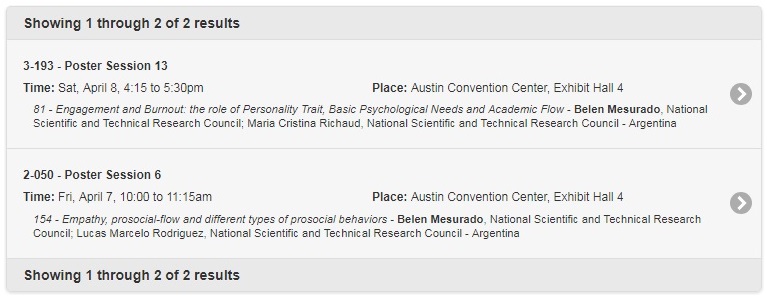 Belén Mesurado, researcher of the project, has participated in the Society of Research of Child Development (SRCD) Biennial Meeting, which took place in Austin, Texas on April 6-8, 2017. She made two poster participations, one prepared together with María Cristina Richaud (National Scientific and Technical Research Council – Argentina), and a second one with Lucas Marcelo Rodríguez (National Scientific and Technical Research Council – Argentina).
Belén Mesurado, researcher of the project, has participated in the Society of Research of Child Development (SRCD) Biennial Meeting, which took place in Austin, Texas on April 6-8, 2017. She made two poster participations, one prepared together with María Cristina Richaud (National Scientific and Technical Research Council – Argentina), and a second one with Lucas Marcelo Rodríguez (National Scientific and Technical Research Council – Argentina).
“Engagement and Burnout: the role of Personality Trait, Basic Psychological Needs and Academic Flow”
Belén Mesurado & María Cristina Richaud
Abstract: Engagement is defined as the presence of mental energy and effective connection with an activity (Bakker & Leiter, 2010). Academic engagement is conceptualized as a combination of interest, enjoyment and concentration toward the learning processes. Initially, authors conceptualized engagement as the opposite of experiencing burnout (a state of mental weariness). Maslach (1993) proposed that burnout is a three-dimensional construct that consists of the experience of exhaustion or depletion, cynicism or indifference, and the absence of professional efficacy towards one’s occupation. Some scholars have related the concept of engagement to that of flow. Flow is defined as an “intense experiential involvement in moment-to-moment activity. Attention is fully invested in the task at hand, and the person functions at his or her fullest capacity” (Csikszentmihalyi, et al., 2005, p. 600). However, engagement and flow are not entirely the same. A recent cross-cultural study has shown that academic flow is an important predictor of academic engagement (Mesurado, Richaud & Mateo, 2016). Others important variables associated with academic engagement, and also with academic burnout, are personality traits and basic psychological needs (Sulea, van Beek, Sarbescu, Virga & Schaufeli, 2016). The Basic Psychological Needs, a subtheory of Self-Determination Theory, postulates that the individual is able to experience autonomously motivated and engaged performance in a specific life domain, if relatedness, competence, and autonomy needs have been met (Ryan and Deci, 2000). Drawing on the Five-Factor Model of personality traits (McCrae & Costa, 2003), Self-Determination Theory, and positive psychology, the present study examines whether personality traits, satisfaction of basic psychological needs, and academic flow are associated with two types of study-related aspects: engagement and burnout. One hundred seventy one Argentinian students (M age= 20.07; SD = 1.05; 70 males 40.94%) participated in this study by completing Ten-Item Personality Inventory (PITI) (Gosling, et al., 2003), Ryan and Deci’s Basic Need Satisfaction Scale (2000), Utrecht Student Engagement Scale and Burnout scale (Schaufeli, et al., 2002) and finally Optimal Experience Scale (Mesurado, 2008). We carried out two Block lineal regressions to test our objective. Engagement is positively associated with conscientiousness and openness. Having high aspirations, being focused on goals (i.e., high on conscientiousness), being creative and intellectually curious (high on openness to experience) obviously play a relevant role in experiencing engagement. These findings are in line with previous research (Mostert & Rothman, 2006). Unexpectedly, however, engagement is not related to any basic psychological needs in the present study. Our results are aligned with a previous study that has shown that academic flow (positive mental state) is an important predictor of academic engagement in undergraduate students (Mesurado, et al., 2016). It is important to highlight that personality traits and academic flow contribute more importantly to the prediction of academic engagement than basic psychological needs. However, in the case of burnout all variables have a similar contribution. Moreover, our results show that conscientiousness and emotional stability prevent burnout. The present study revealed that fulfillment of psychological needs is negatively related to burnout, after controlling for personality traits.
The second presentation, prepared together with Lucas M. Rodríguez was entitled “Empathy, Parental Styles, Prosocial-flow and Different Types of Prosocial Behaviors”, and studies the relationship of parental variables (authoritative parental style, maternal and paternal challenges), empathy and prosocial flow with different types of prosocial behavior (prosocial behavior toward different targets and variously motivated prosocial behavior). 539 students of both sexes (42.5% males; M age = 19.13 years, SD = 1.92) participated in the study. The hierarchical multiple regression analyses indicated that prosocial behavior towards family, and in second place towards friends, are motivated to a much greater extent by the parental variable than by empathy and prosocial flow. When the prediction of prosocial behavior towards strangers is analyzed, it is observed that the variables with greater weight were prosocial flow and empathy. In relation to prosocial tendencies, the results showed that the parental variables, empathy and prosocial flow explain similar percentages of variables in the types of public, responsive, altruist and anonymous prosocial tendencies.

